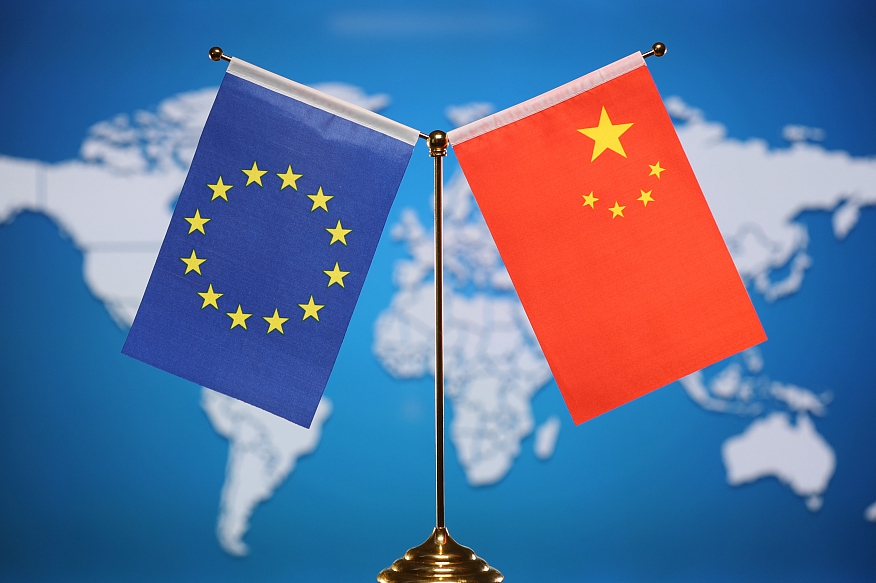Responding to challenges together
- By George N. Tzogopoulos
 0 Comment(s)
0 Comment(s) Print
Print E-mail China.org.cn, December 16, 2020
E-mail China.org.cn, December 16, 2020

This year of 2020 has been a special time for China-EU relations as it marks the 45th anniversary of the establishment of their diplomatic ties.
There was a full agenda planned for high-level exchanges, but due to the COVID-19 pandemic, it has been hard to organize face-to-face summits. So some of them took place virtually, and others were postponed such as China's hosting of a 17+1 cooperation summit and the Leipzig EU-China summit under the aegis of the Germany EU presidency.
On the whole, however, Beijing and Brussels advanced their collaboration in spite of existing disagreements. Last September, for example, they signed a bilateral agreement protecting Chinese and European Geographical Indications (GIs).
The way forward is not easy, but the need to join forces against common challenges makes cooperation more likely. The two sides are intensifying efforts to reach a Comprehensive Agreement on Investment (CAI), which would greatly strengthen economic and trade ties for their joint benefit.
Chinese and EU leaders also decided to establish a high-level dialogue on environment and climate, and another in the digital field, so as to further build their green partnership and digital cooperative partnership.
Insistence on multilateralism brings China and the EU closer. An Élysée press release, for example, noted that French President Emmanuel Macron had welcomed Beijing's pledge to become carbon neutral before 2060 and expressed his support for the organization of the COP15 Kunming conference on biological diversity.
The same press release also referred to the necessity of reinforcing engagement in the context of the G20 and the ACT-Accelerator that has been launched by the WHO to assist global efforts in further developing tools in the fight against COVID-19. In October, the EU had already appreciated China's participation in the COVAX initiative.
The issues on the Sino-European agenda are well-known. What is currently new is the expectation for an end to global uncertainty that could arguably be introduced to world affairs with the opening of the Biden presidency. The subsequent question is how this might impact on the EU interpretation of China.
Most European policymakers and scholars hope that the last four years of serious crisis in transatlantic relations under a Trump presidency can be replaced by inauguration of a new era of better understanding. China will certainly be a critical theme in the new transatlantic agenda.
The European Commission, for instance, has proposed the creation of a specific dialogue with the U.S. on the responsibility of online platforms and Big Tech as well as the establishment of a new EU-U.S. Trade and Technology Council. Brussels and Washington have also already launched a new bilateral dialogue to exclusively concentrate on China.
While cooperation between the EU and U.S. is expected to improve in comparison to the Trump's time in office, Brussels will not necessarily work on Washington's terms. Europe is keen on further developing its strategic autonomy concept and has already charted a course where it can compete and also cooperate with China – without thinking in black and white or endorsing out-of-date mindsets.
This European thinking will perhaps be challenged by the new American administration and the result is yet to be assessed. China, for its part, has already started preparations for all scenarios. Discrepancies in the approaches of Brussels and Washington cannot magically disappear.
Irrespective of the evolution of transatlantic relations under Biden, China's position in a multilateral world order is well-placed. In September, EU foreign policy chief Josep Borrell declared that "you cannot build a multilateral world without China participating in it effectively."
The country's development is an irreversible trend. What now matters is to obtain synergies that will safeguard peace and prosperity at the world level. Challenges are transnational and encompass climate change, global poverty, cyberattacks, nuclear proliferation and terrorism.
It is discouraging that politicization during the COVID-19 pandemic hindered international cooperation to some extent. But world public opinion is sending a message to the right direction. A Pew Research Center survey conducted last summer showed that 59% and 58% of respondents in 14 countries advocated multilateral governance and compromises on international issues respectively.
China and the EU will continuously work to achieve common goals in 2021. The Biden administration will rather enhance the multilateral context where Sino-European relations will be played out, although it will also facilitate the endeavor of Brussels and Washington to talk in good climate about Beijing.
George N. Tzogopoulos is a columnist with China.org.cn. For more information please visit:
http://www.china.org.cn/opinion/GeorgeNTzogopoulos.htm
Opinion articles reflect the views of their authors, not necessarily those of China.org.cn.
If you would like to contribute, please contact us at opinion@china.org.cn.






Go to Forum >>0 Comment(s)